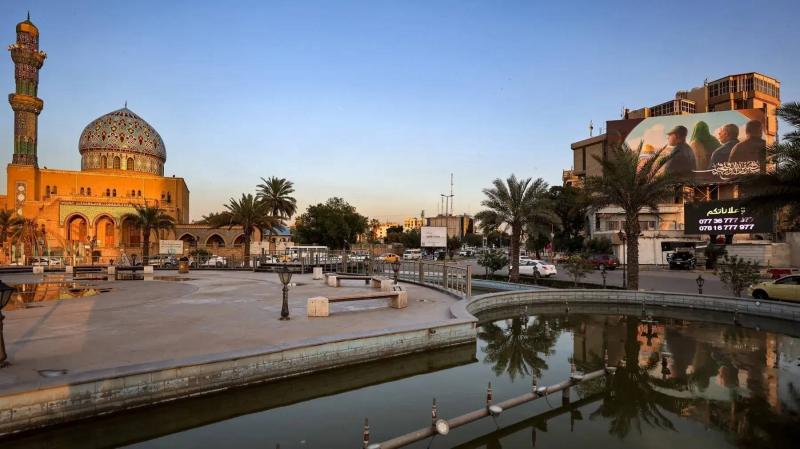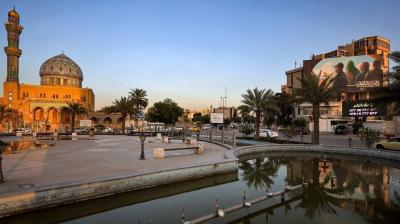Twenty-one years have passed since the return to Baghdad of peace, after a forced absence that lasted more than a decade and a half. I vividly recall those moments as if they were just days ago. A feeling beyond description; as if I was reborn... I returned to Iraq days after April 9, 2003, and the fall of the regime. The dreams and hopes for the establishment of a free democratic state were merely a matter of time. This is what we believed. The potentials, resources, and various capabilities existed, and the necessary climates were appropriate. The state; this term encapsulates our suffering and expresses the aspirations of an opposition that worked sincerely— from abroad— to overthrow a repressive dictatorial regime.
Since my return, I did not wish to be in the spotlight or in close contact with it. I preferred to continue my activities and work in my own way. In that Baghdad house, the home of my spiritual father Dr. Mohammed Makiya and the father of my dear brother and friend Kanaan, it became the center of residence, work, meetings, and discussions. In that simple house overlooking the Tigris River, visions, programs, and projects crystallized, blending ideas and discussions of the external opposition on one side and working to evaluate the emerging experience from within on the other.
I remember clearly— for example— the messages from the late President Jalal Talabani, Prime Minister Iyad Allawi, and President Masoud Barzani, which I have kept to this day, praising our line, ideas, and projects aimed at creating a national identity away from factions and camps. Our work was for Iraq and its people, and for the state and its institutions.
Unfortunately, this line was prevented from developing and growing; the challenges and circumstances following the fall contributed to reducing its presence and effectiveness. The national line became a victim of major sectarian conflicts and did not receive presence or resonance under ruling mentalities that established a state that does not trust itself and does not inspire confidence in itself. I faced difficult choices. What should I do? Should I return from where I came? Should I declare my surrender to circumstances interwoven between local, regional, and international conditions? Or should I seek a new space from which to foresee the future?
In the face of these complexities, amidst the flurry of projects that emerged after the fall, and the accompanying and successive crises, it was necessary to document the experience that Iraqis have endured for more than 35 years. We launched the memory project with the aim of understanding what transpired over those years— the social transformations and their impacts on individuals' behaviors, and how these changed over time. About the dominating fear and its reflections on the widening individual and collective approaches to different issues.
The idea of injustice and victimization was a part or one of the facets of the project; but we wanted— in essence— a very deep understanding of Iraqi society, which was one of the most cultured, aware, and present societies in the Arab and Islamic world, and which became— in two decades— one of the most regressed, closed-off, and fearful societies.
The outcomes were more likely a natural result of a reciprocal behavior between the regime and the people. A regime that disregards borders and does not pay attention to any considerations, and a people governed by fear, who became entrenched in it after growing weary of the bloodshed. Surrendering to reality became the prevailing stance, and the absence of trust in anything became an inseparable trait. What amazed me even more was that the opposition abroad did not differ in behavior from its counterparts within; as if the dictatorial regime (and its ideas) had managed to infiltrate our subconscious, making us all prisoners of the "return of the Ba'ath," in one way or another.
This idea was evident to me in two separate places; among the different segments of society and the ruling political class. Each dealt with it from its own perspective. We were— unfortunately— victims. Victims of this fear and its reflections; we arrived— and perhaps it continues to this day— at a point where we fear change and fear being honest with ourselves and reconciling with ourselves. The memory experience was based on understanding the past and contributing to the foundation of the future, and building a comprehensive Iraqi national identity for all... But did we succeed? Success here is based on two levels; individual success and collective success.
Individually, I can say that those who worked in the institution and experienced it took the first steps toward liberation from fear, breaking away from the ruling factions and moving toward the other, based on the principle that Iraq belongs to Iraqis, and not to one individual, faction, or team. Collectively, memory could not achieve what it wanted in society and from it, and this is also attributed to the nature of society first and the political class and its culture second. I remember well that during that period, there were (individuals and entities) who wanted (and worked) for Iraq to remain a captive of sectarian incitement and a closed state, and there were those who preferred the group and sought shelter in it. There was a consensus to reject the idea and principle of moderation, and its concept, while convictions revolved within the orbit of rupture and its necessity, rejecting any communication or discussion about it for the sake of the public good!
I sensed this mentality among the political leaders before I assumed national responsibility in 2016. The lack of faith in the state and the predominance of narrow interests and gains pushed these leaders to create competing parallel mini-states. The foundations of the democratic state that we desired in 2003 were struck, which was clearly reflected in the security and educational institutions. The outcome of this was "Mosul 2014" and "October 2019."
Have we learned? I hope so... But the statements and interviews we followed during this month do not indicate that. Some do not want to move toward the other or await him halfway. Iraq, as a homeland and a state, and its political system and its product, i.e., the political process, is governed by dialogue, not by breaking wills or exploiting institutions for settling scores, in a context where everyone insists on practicing a constrained democracy, rather than a democracy in its comprehensive sense.
After 21 years, it is time for us to learn from the past and its experiences, and the experiences of our brothers and neighbors, so that we do not repeat mistakes that our children are better off without. The promising future for Iraq— which I always hope for— is based on understanding the past and the movement of history. This requires brave actions from all involved, otherwise, we will be on schedule for a new encounter with "challenges and circumstances," as some say in secret here and there...




